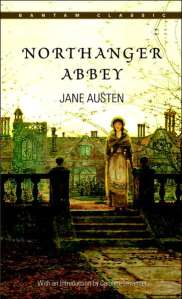We should think it rather odd if a profiteer had a country
house that was called The Cathedral. We might think it strange if a stockbroker
had built a villa and habitually referred to it as a church. But we can hardly
see the preposterous profanity by which one chance rich man after another has
been able to commandeer or purchase a house which he still calls an Abbey. It
is precisely as if he had gone to live in the parish church; had breakfasted on
the altar, or cleaned his teeth in the font. That is the short and sharp
summary of what has happened in English history; but few can get it thus
foreshortened or in any such sharp outline. Anyhow, this third type of monument
of the past does offer itself visibly to the eye like the other two. The
romantic reactionary at the end of the eighteenth century might not often find
the Bad Baronet in a castle, but might really find him in an abbey. The most
attractive of all such reactionaries, Miss Catherine Morland, was not
altogether disappointed in her search for the Mysteries of Udolpho. She knew at
least that General Tilney lived in an abbey; though even she could hardly have
mistaken General Tilney for an abbot. Nor was she wrong in supposing that a
crime had been committed by that gentleman in Northanger Abbey. His crime was
not being an abbot. But Jane Austen, who had so piercing a penetration of the
shams of her own age, had had a little too much genteel education to penetrate
the shams of history. Despite the perverse humour of her juvenile History of England, despite her spirited sympathy with Mary Stuart, she could not be
expected to see the truth about the Tudor transition. In these matters she had
begun with books, and could not be expected to read what is written in mere
buildings and big monuments. She was educated, and had not the luck to be
self-educated like Cobbett. The comparison is not so incongruous as it may
seem. They were the four sharpest eyes that God had given to the England of
that time; but two of them were turned inward into the home, and two were
looking out of the window. I wish I could think that they ever met.
From Chesterton's William Cobbett.
BTW: Jane Austen enthusiasts will mark 2017 as the 200th anniversary of her death. She will replace Charles Darwin on the ten pound note, according to this BBC story in 2013!

No comments:
Post a Comment